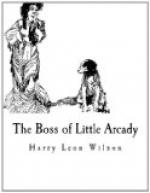His tones were those of benevolence that has been ill-requited.
“That was las’ station,” broke in the aggrieved passenger, “an’ they wouldn’t stop the train there ’cause they said it was a ’spress train and mustn’t stop at such little stations—”
“I tried awful hard to stop her,” said the crafty Sullivan at the throttle, “but she got away from me. She did so, now!”
“And I said, ‘First to be engineer,’” resumed the passenger, bitterly, “an’ they wouldn’t let me, an’ I said, ‘Secon’ to be engineer,’ an’ they never let me, an’ I said, ‘Las’ to be engineer,’ an’ they never let me.”
“She wants to be everything” said my namesake, rendered a little sullen by this concise putting of her case.
“You come with me,” I said to the passenger, “and we’ll do something better than this—something fine!”
Her face brightened, for she knew that I never made idle promises as do so many grown-ups. She jumped from her seat, even though the first Sullivan tooted a throaty whistle and the second rattled his brake machinery in warning. I helped her over the side of the box, and as we walked away she shouted back to the bereaved express train a consolatory couplet:—
“First the worst, second the
same,
Last the best of all the game!”
That superb machinery of travel was silent, and the mechanics and officials, robbed of their passenger, eyed us with disfavor.
“They are terrapin-buzzards!” exclaimed my woman child, with deep conviction.
I shuddered fittingly at the violence of her speech.
Before we had gone far the train-boy deserted his post and came running after us.
“John B. Gough!” he exclaimed bitterly—profanely.
“He’s swearing,” warned his sister. “Look out, Uncle Maje, or he’ll say ‘Gamboge’ next.”
“I don’t care,” retorted the indignant follower; “you can’t have a train without any passenger—it’s silly. I don’t care if I do say Gamboge. There! Gamboge it!”
I turned upon him. I had endured “terrapin-buzzards,” hurled at the group by my woman child, perceiving need of relief for her pent-up passion. I had, moreover, for the same reason, permitted my namesake to roll under his tongue the formidable and satisfying expletive, “John B. Gough!” But I felt that the line must be drawn at Gamboge. Terrapin-buzzards was bad enough, though it was true that this might be used innocently, as in a moment of mild dismay, or as an exclamation of mere astonishment without sinister import. But Gamboge!—and ripped out brazenly as it had been?—No! A thousand times No!
“Calvin,” I said sternly, “aren’t you ashamed to use such language—before me—and before your little sister?”
But here the little sister sank beneath her true woman’s level by saying:—
“I know worse than that—Dut!”
With a look of deadly coldness I sought to chill the pride that shone in her eyes as she achieved this new enormity.




